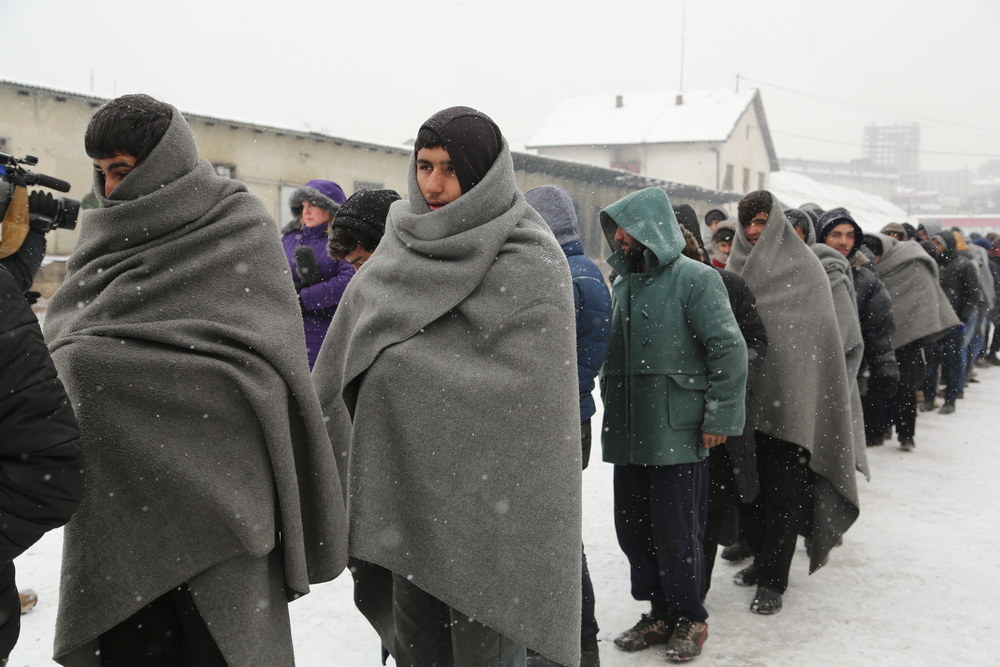
Lipa camp: an old story, a persistent violation of human rights
3 February, 2021
On 23rd December 2020, the Lipa camp in northwest Bosnia and Herzegovina was burned down and thousands of migrants living there are now trying to survive by relying on the solidarity of the civil society and looking for makeshift housing nearby. This sounds like a familiar story and, as in the case of the emergency in the Moria camp, it brings to light the instability and tough conditions refugees and migrants encounter at the gates of the EU.
A deeply unstable situation
The images that are filmed every day and shown to the world from Bosnia are terrible. Since the 23rd of December, thousands of people – about 3,000 according to IOM’s estimates – have been forced to live in the open, in the forests around the camp or in abandoned buildings, in the midst of snowstorms and adverse weather conditions. During these days, temperatures reach as low as -10° and the migrants have nothing, but an improvised fire, blankets and food donated by civil society organisations or private individuals. Even though the Bosnian army has started to set up tents to host migrants, they are not enough. Migrants have no water, no electricity, no medicines. Even though many humanitarian organizations, such as the Red Cross, have reached the place to support migrants, this emergency approach is not and cannot be satisfactory.
The Bosnian police has reported that camp residents have started fires to protest against the IOM’S withdrawal from the site. On 11th December 2020, the IOM had requested to move migrants living in the camp to a reception centre in an abandoned factory, stating that the Lipa camp was not equipped for the cold weather. However, its request was not accomplished. Therefore, the IOM has decided that it would stop funding the camp, determining its shutdown. Right after its closure, the camp was destroyed by fire. Whoever caused the fire showed once again how precarious the fate of those who want to enter the EU is.
Bosnia has been receiving endless criticism by numerous sides on how it is handling this serious humanitarian emergency, also given the internal decentralization of the power structure. The European Union has publicly criticised how Bosnian local authorities have managed the camp. The EU Foreign Affairs Commissioner Josep Borell stated that this crisis was “largely due to the dysfunctioning governance in the country”. The EU has given great economic support to Bosnia, but the country did not properly use the received funds. In addition, internal contrasts between the central Bosnian government and the local authorities continue to perpetrate unsatisfactory emergency management. Numerous other EU representatives have expressed their concern, defining the situation as “completely unacceptable”. This bad management of the crisis will impact the entry of Bosnia in the EU, but much earlier it will have a major influence on the lives of thousands of people.
What prospects for migrants?
“What do we do, we don’t have any options”, says a migrant who used to live in Lipa and who is now living in an abandoned house. All migrants would like to reach another country, to have the chance to work, to gain money for their families and to have a decent life elsewhere. But today, it seems that these people have little left to hope for. Apart from supporting countries like Bosnia economically, the European Union has no intention of taking charge of these people. For the EU, the funds aimed at Bosnia represent a way of detaching itself from the responsibility to act, given the fact that formal help to face the emergency has already been provided in this case to Bosnia. All these actions of support are part of the EU’s management of the external borders, the common strategy with which the European Member States react to the recent migratory developments. The EU “aims to establish common standards for controls at its external borders, and to gradually put in place an integrated system for managing them”. Among the various procedures, there is the “cooperation with third countries”, like in this case Bosnia and Herzegovina. It is important for the EU to support transit countries, but it cannot be seen as an excuse for not acting more effectively and directly for the benefit of migrants and refugees. In addition, EU countries such as Croatia have been repeatedly accused of violent refoulement to prevent migrants from entering EU territory. These actions must be absolutely condemned and abolished in future. It must be demanded that the EU does not close its doors with violence but is able to support immigration flows in a responsible way and respectful of fundamental human rights. Moreover, no Member State has offered to host even a part of these migrants who are suffering serious violations of their human rights. So, it seems clear that the only thing left to do is to hope that someone will decide to take responsibility for these thousands of lives.